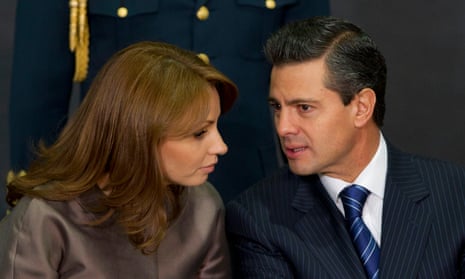The Catholic church in Mexico has been accused of bending its own rules on marriage to allow Enrique Peña Nieto to enhance his image ahead of his successful run for president.
Documents obtained by investigative reporters appear to show that the church hierarchy fast-tracked a marriage annulment for the actor Angélica Rivera, who became Peña Nieto’s wife 19 months before he was elected president.
The claims of ecclesiastical irregularities come days before Pope Francis makes a six-day trip to Mexico, in which he is expected to address touchy topics such as corruption, inequality and insecurity – matters on which the Mexican government has mostly stayed silent under Peña Nieto.
Reporters with the news weekly Proceso and online news organization Aristegui Noticias obtained the documents, which were shared with the Guardian.
Peña Nieto’s first wife, Mónica Pretelini, died in January 2007 after suffering an epileptic seizure. His subsequent romance with Rivera, who had been hired as the public face of Mexico state, where Peña Nieto was governor, produced a steady stream of puff pieces and cover stories in the country’s gossip magazines.
Rivera, a popular soap opera star, was married to TV producer José Alberto Castro from 2004 to 2008. They have three daughters together, including two who were born out of wedlock. The archdiocese of Mexico City annulled their marriage in May 2009, noting that the ceremony had taken place on a beach in Acapulco and exhibited “defects of canonical form”.
But the newly revealed church documents cast doubt on the archdiocese’s story that an improper wedding ceremony was sufficient grounds to annul the marriage.
A copy of Castro and Rivera’s Catholic marriage certificate appears to show a proper church ceremony took place in a Mexico City parish on 2 December 2004 – before the Acapulco beach service and in contradiction of archdiocesan claims that it did not take place in an authorized house of worship.
Annulments are available to all Catholics, though the process is cumbersome and can take years to complete, according to a priest consulted by the Guardian. That is especially true for those lacking the cash or connections to people in prominent positions. Pope Francis has only recently attempted to make annulments more accessible.
“Working class Mexicans would almost never be able to get an annulment,” said Father Robert Coogan, an American priest in the city of Saltillo.
“It could take four or five years,” Coogan said, adding that most people do not have their documents in the proper order, cannot navigate the paperwork and are unable to afford the fees.
Documents show the archdiocese of Mexico City vigorously pursued a priest popular with telenovela actors, Father José Luis Salinas Aranda, who presided at the Acapulco ceremony – which he described as a repetition of vows.
One archdiocesan document proposes punishing Salinas for “irregularities” in the Castro-Rivera marriage. It cited Rivera and three witnesses – all her sisters – who claimed they did not “understand” they were signing a church marriage certificate at the ceremony in Mexico City.
A spokesman for the archdiocese of Mexico City, Father Hugo Valdemar, denied there had been any irregularities and told the Guardian the annulment “followed the proper process”. He added that the original marriage in the Mexico City parish was celebrated with the intention that it would be repeated in Acapulco by a priest lacking the proper permission to perform it.
Valdemar also denied any political motives for granting the annulment.
Salinas died of cancer in October 2015. In 2012, a Vatican tribunal known as the Roman Rota absolved him of any ecclesiastical wrongdoing in Rivera’s marriage. A letter to the Vatican in 2009 by Father Enrique González Torres, the prominent former rector of the Jesuit-run Universidad Iberoamericana, condemned the archdiocesan actions against Salinas as “full of irregularities”.
“It is very sad that to indulge a lady, who wishes to marry the governor of Mexico state, Enrique Peña Nieto, in a church wedding, a travesty of justice is committed,” González Torres wrote in a 18 December 2009 letter defending Salinas.
The letter was sent two days after Peña Nieto went to the Vatican with bishops from his home state. In an audience with Pope Benedict XVI, he introduced the pope to Rivera and made their marriage plans public for the first time.
“Even more worrying to me is that the president of the Mexican bishops’ conference accompanied these people,” González Torres wrote, “vouching for their upcoming church wedding, when the annulment of Angélica Rivera’s first marriage was done fast-track, hastily and was full of irregularities.”

Comments (…)
Sign in or create your Guardian account to join the discussion